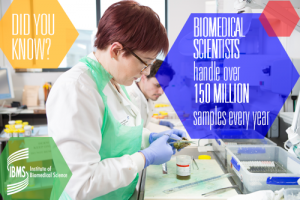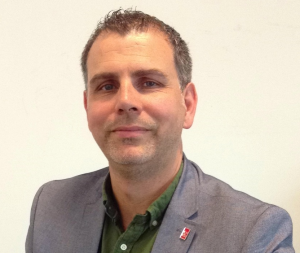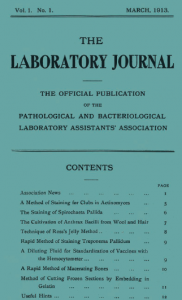To celebrate Biomedical Science Awareness Day on Wednesday 19th July, Biomedical Science lecturer Ian Davies reflects upon the identity of the profession and their role in healthcare.
“So what’s that?” “Just like Prime Suspect” “Ugh, you do what?!” – just some of the responses I have had when conversations turn to careers and education. Despite being a biomedical scientist for over 20 years, amongst 23,000 registered by the Health and Care Professions Council (HCPC) within the UK, it can still be difficult to clearly explain what we do and why we do it.
Being a biomedical sci entist brings together a unique mix of laboratory skills, scientific and clinical knowledge and patient-centred professional practice and focuses them upon investigating the body’s response to disease. Clinically this could be in the diagnosis and monitoring of disease, in research though uncovering the detail of disease processes (often at the genomic level) or in the development and production of new diagnostic tools or interventions. It’s not just humans either – our ‘patients’ range from flasks of cell culture disease models to the entire range of species encountered by veterinary laboratories. It goes further still – the transferrable skills of biomedical science graduates are well utilised across a wide range of life science and education professions where their ability to integrate knowledge and apply it in a professional and innovative way are prized assets.
entist brings together a unique mix of laboratory skills, scientific and clinical knowledge and patient-centred professional practice and focuses them upon investigating the body’s response to disease. Clinically this could be in the diagnosis and monitoring of disease, in research though uncovering the detail of disease processes (often at the genomic level) or in the development and production of new diagnostic tools or interventions. It’s not just humans either – our ‘patients’ range from flasks of cell culture disease models to the entire range of species encountered by veterinary laboratories. It goes further still – the transferrable skills of biomedical science graduates are well utilised across a wide range of life science and education professions where their ability to integrate knowledge and apply it in a professional and innovative way are prized assets.
Biomedical Science Awareness Day takes place on Wednesday 19th July, the anniversary of the birth of Albert Norman MBE, founder of the Institute of Biomedical Science. In 1912 Albert was fundamental in the formation of the “Pathological and Bacteriological Laboratory Assistants Association (PBLAA)” which aimed to bring communication, advancements of practice and development of methods and techniques to the growing workforce of “unskilled menials” working in early emerging pathology laboratories. Over 100 years later the association, now the Institute of Biomedical Science, is the focus of our professional identity, the workforce is highly educated and skilled, and its practitioners contribute significantly to the scientific community within the NHS.
In recent years “Healthcare Science” has become a collective term for the vast array of scientific professions working within healthcare. The healthcare science workforce range from biomedical and clinical scientists to neurophysiologists and renal technicians – each with their individual identities but together with a collective voice to influence health policy, amplify the role of scientists in healthcare and to form collaborative connections. Biomedical Science and Healthcare Science are not mutually exclusive terms – as biomedical scientists we have a strong professional identity and in conjunction with our other healthcare science colleagues we are able to have increasing and proactive influence upon the models of healthcare delivery to ensure that diagnosis and treatment are informed by the latest scientific understanding and applications.
So why is identity important? As our students develop their academic and practical learning, they also go through a transition of identity as they enter communities of practice. This developing identity provides a purpose, a sense of belonging, a language and nuances that develop respect and recognition – in essence the cohesiveness upon which their learning can flourish.
In September we are launching a suite of new healthcare science degrees to develop biomedical scientists within the NHS. Students will understand their role within the wider healthcare science community (and the opportunity for collaboration and interdisciplinary working this brings); they will also develop their own identities as biomedical scientists as they draw together their scientific, clinical and practical knowledge and apply it for patient benefit.
So, returning to my original dilemma – well, depending upon the audience I either apply scientific investigation in the study of disease, I help people by informing diagnosis and treatment or, if I’m talking to my daughter, I play with blood….

Ian is an HCPC registered Biomedical Scientist and course leader for our Healthcare Science programmes and can be contacted at ian.davies@staffs.ac.uk or via Twitter @StaffsBMS
More information about Biomedical Science Awareness Day is available from the Institute of Biomedical Science website www.ibms.org
Find more information about our Biological and Biomedical Science Courses at: http://www.staffs.ac.uk/undergraduate/subjects/biological-and-biomedical-sciences/


